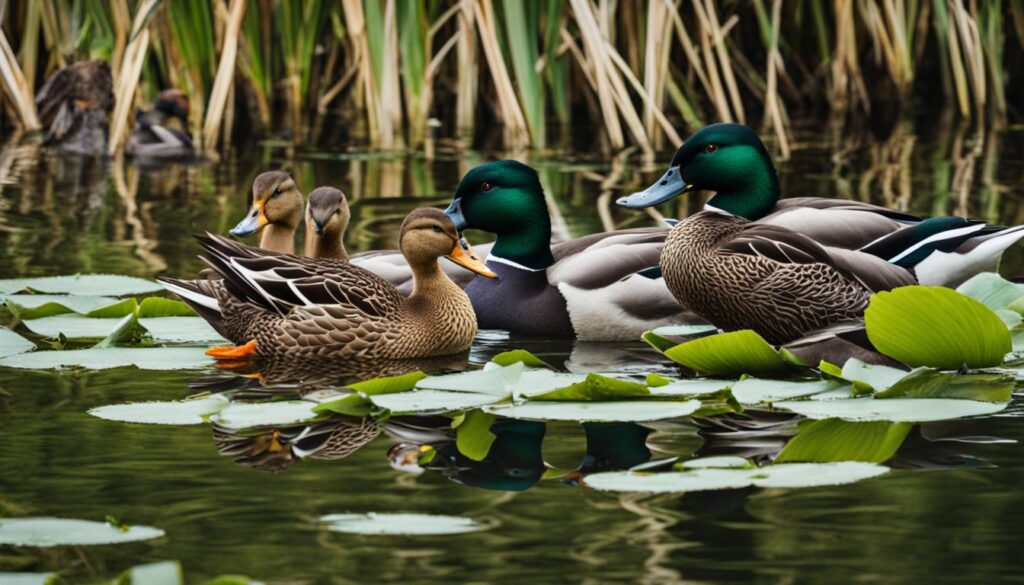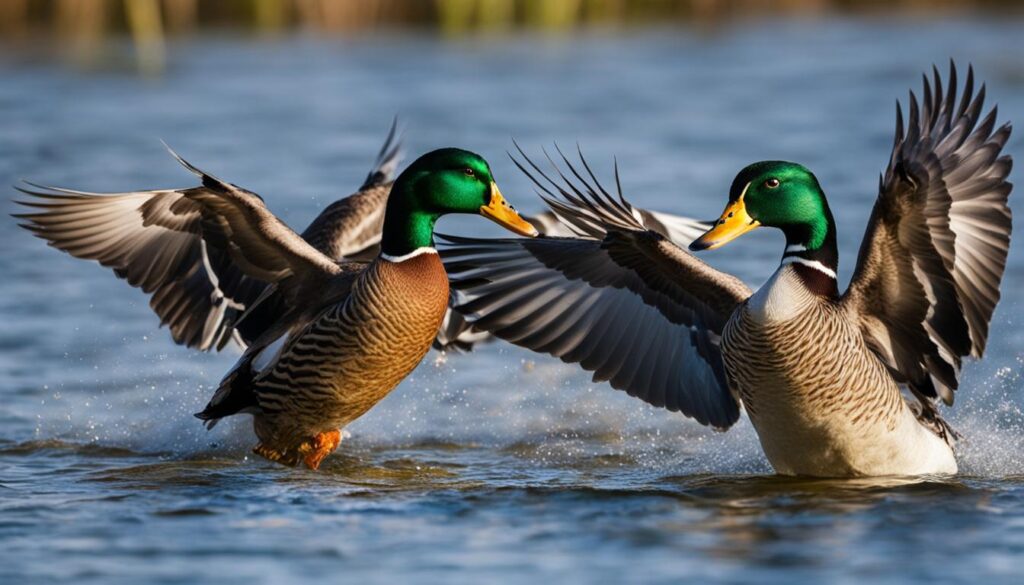As a hobby farmer, I’ve spent countless mornings watching the sun rise over my backyard ducks, their silhouettes a tranquil scene against the awakening horizon. But even in this idyllic setting, nature has its dramas. Understanding the dynamics of duck behavior is crucial for anyone invested in the care of these feathered friends. You might be wondering, within their quacking commotions and flapping wings, do ducks fight to the point of fatality? Let’s take a deep dive into the world of duck disputes and decode what’s really going on when feathers ruffle.
Key Takeaways
- Duck altercations are often about establishing pecking order rather than causing harm.
- Understanding duck behavior is essential for maintaining a peaceful backyard flock.
- Observing interactions can help hobby farmers preempt and prevent serious duck disputes.
- While confrontations do occur, they rarely result in death among ducks.
- Creating a harmonious environment can mitigate much of the aggression seen in duck behavior.
Understanding Aggressive Behaviors in Ducks
As I immerse myself deeper into the world of backyard poultry, it’s become increasingly clear how integral it is to comprehend why aggressive ducks act the way they do. Unraveling the causes and indicators of aggression can help hobby farmers like me prevent disruptions in our flocks and maintain a peaceful coexistence among our feathered friends.
Identifying Common Triggers for Duck Aggressions
Aggressive ducks often react to certain stimuli in their environment. Common duck aggression triggers include:
- Competition for food and mates, which can intensify during breeding season.
- New arrivals or changes in the flock structure, leading to social realignment.
- Encroachment on their territory, making territorial ducks defensive and confrontational.
The Signs of Aggression in Duck Flocks
Distinguishing the telltale signs of duck aggression is the key to managing flock dynamics effectively. While observing my ducks, several behaviors stand out:
- Excessive pecking that goes beyond gentle foraging.
- Persistent chasing, which can stress or injure the pursued duck.
- A noticeable increase in loud and consistent quacking that disrupts the usual flock soundscape.
These behaviors often require intervention to prevent escalation and maintain harmony in the coop.
Roles of Dominance and Territoriality in Duck Behavior
The concepts of dominance in ducks and their territorial nature are central to understanding why ducks might become aggressive. Ducks establish pecking orders, and those at the top will enforce their status through assertive behavior. Additionally, ducks are territorial creatures by nature. They often display aggression near nesting sites or feeding areas they’ve claimed as their own. Acknowledging and managing these aspects of duck behavior is vital for anyone looking to cultivate a tranquil duck habitat.
To mitigate these issues, it’s not just about recognizing the signs and triggers of aggression but also about implementing strategies to alleviate stressors in the flock. By doing this, you can promote a more relaxed, less combative environment among your ducks.
Nature or Nurture: What Drives Ducks to Fight?
As we delve deeper into the etiology of duck conflicts, it becomes essential to address the long-standing debate of nature versus nurture in ducks. Do genetic blueprints determine their pugnacious tendencies, or does the environment play a pivotal role in shaping their behavior? From my experience, both elements contribute significantly to the manifestation of duck behavior causes.
Genetics undoubtedly play a role in a duck’s disposition, with certain breeds exhibiting more aggression than others. For instance, Muscovy ducks are known to display less aggressive behavior compared to Pekins. However, environmental stimuli cannot be discounted. Ducks raised in cramped conditions or experiencing resource scarcity are more likely to exhibit stress-related aggressive behaviors.
Let’s explore the factors that contribute to this behavior through the following comparative table:
| Influence | Nature (Genetic Factors) | Nurture (Environmental Factors) |
|---|---|---|
| Breed | Some breeds have inherently strong territorial instincts | – |
| Upbringing | Early separation from the mother can lead to social behavior issues | Socialization with humans and other ducks can reduce aggressive tendencies |
| Resource Availability | – | Competition for resources like food and nesting space can incite fights |
| Space | – | Overcrowding can lead to stress and increased aggression |
| Handling by humans | – | Gentle handling can promote trust, reducing fear-based aggression |
The aforementioned data reflects that while nature instills certain instincts within ducks, nurture greatly influences their actual behavior. By understanding these nuances, hobby farmers can better manage their flocks and create a harmonious environment.
“Observing ducks in their natural habitat, free to roam and forage, presents an observable difference in behavior compared to those raised in restrictive conditions.” This anecdote reinforces the influential power of nurture on duck demeanor.
In my venture to elucidate the reasons behind duck altercations, it’s clear that the interaction between their inherited traits and the quality of their upbringing is complex. Monitoring and adjusting nurturing strategies can help mitigate aggressive duck behavior and minimize the occurrence of duck behavior causes.

Do Ducks Fight to the Death?
When we talk about duck behaviors, one question often surfaces in conversations among hobby farmers and avian enthusiasts: do ducks engage in deadly duck fights? The short answer is, fortunately, such instances are relatively scarce. But what exactly leads to fatal duck aggression and can these confrontations cause duck mortality? I’ve taken the time to sift through scientific studies and gathered insights from seasoned farmers to shed light on this intriguing aspect of duck behavior.

Most encounters that might be labeled as aggression in ducks are posturing or dominance displays rather than actual fights with an intention to kill. Even so, it’s crucial to understand and recognize what can tip the scales from a harmless scuffle to a potentially hazardous altercation. Factors influencing the outcome of such confrontations include the ducks’ individual characteristics, the dynamics within the flock, and timely human intervention.
Let me share with you a table that illustrates the contributing factors to aggressive behaviors that could escalate and how they can be managed:
| Contributing Factor | Impact on Duck Behavior | Management Approach |
|---|---|---|
| Resource Competition | May lead to fighting over food or nesting sites | Provide abundant resources to minimize contention |
| Mating Rivalries | Drakes may become aggressive during breeding season | Ensure a proper male-to-female ratio in the flock |
| Overcrowding | Close quarters can incite stress and fighting | Maintain spacious living conditions for the flock |
| Introduction of New Ducks | Can disrupt the flock’s social hierarchy | Implement slow and supervised introductions |
From the table, it’s evident that while aggression can occur, steps can be taken to mitigate its severity and prevent it from turning fatal. Indeed, attention to these aspects can help us foster a peaceful and healthy environment for our feathered friends.
In conclusion, the image of ducks engaging in combat to death is more of a myth than a reality. By understanding the behaviors of our backyard ducks and providing them with a nurturing environment, we can significantly reduce the incidence of severe fights. After all, a happy duck is a peaceful duck, and I believe that’s what we all aim for in raising our delightful web-footed companions.
Preventive Measures for Hobby Farmers to Minimize Duck Conflicts
As a hobby farmer, I’ve seen firsthand how essential a serene and accommodating environment is for maintaining peace amongst backyard ducks. To prevent duck fights, several proactive steps can be taken to promote a harmonious living space. Ensuring ample room for each duck, providing multiple feeding and watering stations, and maintaining a clean habitat contribute significantly to reducing stress and aggression. Crafting a living space that allows ducks to roam freely without overcrowding can diminish the chances of disputes, establishing a peaceful coexistence in the flock.
Creating an Optimal Living Space for Ducks
Building a duck-friendly habitat goes beyond mere shelter from the elements. It’s about tailoring the duck living space to meet their natural instincts. Including features like a clean pond or pool for them to swim and a safe haven for rest have remarkable effects on their welfare. A key aspect is allocating enough space per duck; this avoids overcrowding and ensures that each feathered friend can indulge in their instinctive behaviors without encroachment, thus efficiently preventing duck fights.
Techniques for Managing a Multi-Duck Environment
Managing multiple ducks is not just about space but also about managing relationships within the flock. My approach incorporates regular monitoring of their interactions and establishing a routine that ducks can rely on. Feedings at consistent times and places, for instance, help reduce competition and hurried behavior. Observing flock dynamics enables me to intervene when necessary, gently correcting or separating ducks when tensions rise to prevent escalation into conflict.
Introducing New Ducks to the Flock Without Inciting Violence
Welcoming new ducks requires a delicate balance and careful introduction to ensure seamless integration. When introducing new ducks, I first allow them to observe each other from a safe distance, thus minimizing initial resistance or surprise. Gradual co-mingling under supervision permits existing and incoming ducks to become acquainted without immediate threat or competition. This cautious approach can pave the way for new ducks to become accepted members of the flock, with a minimal risk of inciting violence or aggression.
